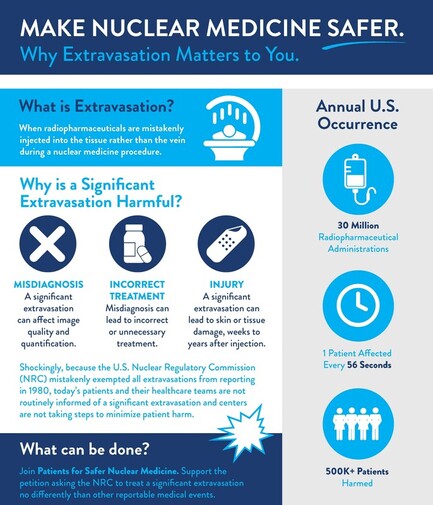
Millions of Americans get nuclear scans for cancer, heart problems, and brain diseases every year. Right now, health care providers aren’t required to report errors called extravasations, which is when a radioactive drug is accidentally injected into healthy arm tissue instead of a vein prior to a nuclear scan. Large extravasations meet medical event reporting criteria but are incorrectly exempted. There are no federal rules that require hospitals and clinics to report them, not even to the patient.
We’re spotlighting patients like Pam who’ve experienced an extravasation.
Has this happened to you?
Join Pam, and our coalition members, to push for safer nuclear medicine scans.
We’re spotlighting patients like Pam who’ve experienced an extravasation.
Has this happened to you?
Join Pam, and our coalition members, to push for safer nuclear medicine scans.
Pam was extravasated during a routine nuclear medicine scan.
This could happen to you.
|
|
Pam Kohl is a metastatic breast cancer patient whose length of life depends on the accuracy of her nuclear scans. During a recent scan, she was extravasated. “I felt something burn,” she says. “I really felt something wasn’t right.” Watch Pam's story and get involved. |
We’re Patients for Safer Nuclear Medicine, a coalition of patient advocacy groups and corporate partners demanding that patients get the information they need about extravasations so their diseases are accurately diagnosed and treated.
Support patient safety.
Support health care accountability.
Support Patients for Safer Nuclear Medicine.
Support patient safety.
Support health care accountability.
Support Patients for Safer Nuclear Medicine.
